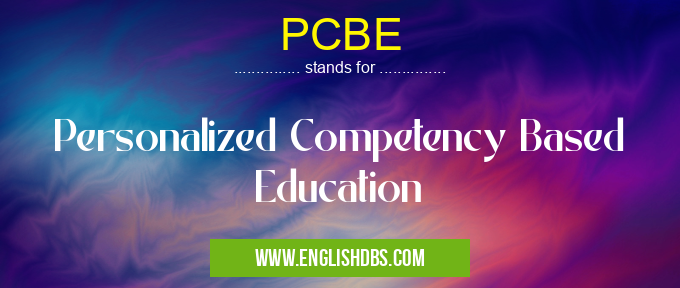What does PCBE mean in EDUCATIONAL
PCBE stands for Personalized Competency Based Education. It is an approach to education that allows students to learn at their own pace and according to their individual needs. PCBE emphasizes skills rather than content as the primary focus of learning, allowing students to develop the skills necessary for success in a career or further education. PCBE also allows teachers to tailor instruction around the individual goals and abilities of each student, providing instructional activities based on what each student has demonstrated they can do already.

PCBE meaning in Educational in Community
PCBE mostly used in an acronym Educational in Category Community that means Personalized Competency Based Education
Shorthand: PCBE,
Full Form: Personalized Competency Based Education
For more information of "Personalized Competency Based Education", see the section below.
» Community » Educational
Benefits Of Using PCBE
Using personalized competency-based education has several benefits for both educators and students alike. By focusing instruction on individual needs rather than curricular objectives, teachers can provide tailored instruction that responds directly to the needs of their students. Additionally, PCBE encourages an inquiry-based approach to learning where questions are encouraged and critical thinking is rewarded, resulting in greater engagement from learners compared with traditional educational approaches such as lectures and tests. Lastly, this type of education helps ensure that all students are capable of meeting expected outcomes as they progress through their program due to its flexible nature which adapts instruction accordingly depending on the proficiency level of each learner.
Essential Questions and Answers on Personalized Competency Based Education in "COMMUNITY»EDUCATIONAL"
What is Personalized Competency-Based Education?
Personalized Competency-Based Education (PCBE) is an instructional approach that focuses on the student learning and mastery of key competencies through personalized instruction. It is designed to move away from the traditional, one-size-fits-all approach to learning and focus on individual learning needs, strengths, and goals.
What are the benefits of PCBE?
PCBE provides students with a personalized educational experience that allows them to learn at their own pace. It also encourages collaboration between instructors and students, which can lead to deeper understanding of subject matter. Additionally, it can help foster self-confidence in students by giving them autonomy over their learning. Finally, PCBE can provide more equitable access to quality education for all learners.
How does PCBE differ from traditional education?
Traditional education emphasizes rote memorization and standardized testing whereas PCBE focuses on mastery of core competencies through hands-on activities, project work, mentorship programs, etc. In addition, assessments used in PCBE are designed to measure individual progress rather than comparison with other students’ scores.
How does technology play into PCBE?
Technology has become an essential part of a modern classroom - especially in terms of personalized learning models - and has played an important role in making PCBE possible. Technology enables instructors to tailor students’ assignments and provide feedback quickly while providing greater access to resources for each student. Furthermore, technology can be used to facilitate collaborative projects among classmates or connect learners globally through virtual classrooms.
What type of feedback do teachers give during a competency based course?
In a competency based course, teachers provide feedback that focuses on the mastery of core skills throughout the duration of the course as opposed to just giving grades on tests or assignments at the end. This type of feedback is much more constructive as it helps guide the student towards success instead of simply assessing what was already completed according to a predetermined rubric or standard assessment method. Additionally, teachers may use technology tools such as online quizzes or discussion forums to assess how well the student is grasping content and areas where they need more guidance or support.
How do instructors assess competence in a competency based classroom?
Instructors typically use performance tasks which involve completing activities or projects related to specific topics such as designing an experiment or constructing something out of materials provided in class etc., Over time these assess the learner’s ability and demonstrate mastery of skills. In addition, instructors will typically conduct formative assessment activities throughout training sessions/units that involve quizzes/questions etc., which allow them to get real-time status updates on how each learner is performing against expected performance levels.
How do you track progress in a competency based curriculum?
Tracking progress within a competency based curriculum typically involves using data such as attendance rates; assignment completion; test scores; progress reports; portfolios; demonstration projects; badges earned etc., This data then allows instructors/administrators track each learner’s progress along core skill pathways while allowing for adjustments if needed.
Who should consider adopting PCBE?
Any organization looking for an alternative instructional approach like homeschooling groups; educational institutions; businesses needing specialized employee training/development programs etc., may benefit from using PCBE due its customization capabilities which further facilitate individualized learning plans tailored according to learners needs.
Final Words:
Personalized Competency Based Education (PCBE) provides an innovative approach to delivering quality education tailored specifically for each individual learner’s needs and abilities. By focusing solely on mastering key competencies rather than completing assigned content, this approach ensures all learners achieve success in a subject area by demonstrating proficiency in required tasks prior to moving forward with new information or ideas. Additionally, because it allows instructors greater flexibility when designing instructional activities, classes are able to be more engaging while still providing adequate challenge for all participants regardless of ability levels or previous knowledge. As such, PCBE offers numerous benefits that make it invaluable resource for modern classroom settings.
